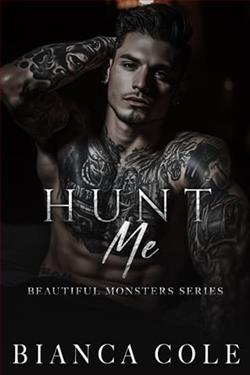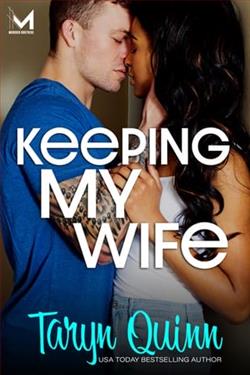Page 35 of Matched with the Small Town Chef
Outside, I walk aimlessly through town, memories surfacing from my past—so different from the community solidarity I've just witnessed.
Growing up in a series of sterile apartments with a mother who worked two jobs and still couldn't afford fresh vegetables. The revelation of my first authentic restaurant meal at sixteen, paid for with weeks of babysitting money, showed me that food could be more than mere sustenance, that it could tell stories and create experiences.
My college years were spent waiting tables while studying journalism, allowing me to witness the power dynamics of fine dining from the service side. How I swore I'd be the critic who remembered what it felt like to choose between paying rent and eating well. How, somewhere along the way, that mission twisted into becoming The Executioner, known more for clever takedowns than championing worthy establishments.
When did I stop seeing the humans behind the restaurants I reviewed?
My feet carry me to the corner of Pine and Aspen. Mabel's Guest House is a Victorian painted lady in faded blues andcreams, its wraparound porch sagging slightly but still graceful. A banner strung between porch columns reads "Save Mabel's Place - Community Fundraiser Today!"
Tables and chairs have been arranged across the expansive front lawn. A makeshift outdoor kitchen occupies one corner, where I spot Hunter's tall frame directing a small army of volunteers. He moves with the same controlled grace he shows in his professional kitchen, though dressed casually in jeans and a faded t-shirt bearing the logo of a local brewing festival.
I should leave. This is precisely the kind of community event that would make excellent color for my review, but I'm no longer pretending to be objective. Yet I find myself drawn forward, pulled by some need I can't quite name.
Hunter looks up as if sensing my presence. His face transforms, lighting with genuine pleasure that makes my chest ache.
"Audrey!" He crosses the lawn in long strides, wiping his hands on a towel tucked into his back pocket. "You found us."
"I heard about it in town." Not exactly a lie. "It seemed important."
"It is." He takes my hand, an easy gesture that feels alarmingly natural. "Mabel's is the heart of this town. Come on, I'll introduce you."
Before I can object, I'm being led through the gathering crowd. Hunter's hand warm around mine. He introduces me to what feels like half the town's population—the mayor, the elementary school principal, local artisans, and shopkeepers. To each, he says the same thing: "This is Audrey, a special friend of mine."
The simple designation warms me even as guilt twists beneath. What would these smiling people think if they knew I was here to evaluate them, to judge their beloved hometownchef? That my word could potentially devastate the economic lifeline Hunter has helped create?
"Hunter Morgan, are you going to hog that lovely young woman all to yourself?" The voice rings with authority despite its age.
A tiny woman with silver hair twisted into a crown of braids approaches, leaning on a carved wooden cane. Despite her small stature, she exudes a commanding presence. People step aside automatically.
"Gram." Hunter's face softens with unmistakable love. "I was just coming to find you. This is Audrey."
"Eleanor Morgan." She offers a hand that feels like soft paper over bird bones but grips with surprising strength. Eyes identical to Hunter’s. She assess me with unnerving perception. "So you're what's had my grandson walking on air these past few days."
Heat rises to my cheeks. "I wouldn't say that."
"I would." Her laugh is unexpectedly rich for such a small frame. "Know how I can tell? He made his special wild blackberry compote this morning. He only does that when he's sweet on someone."
"Gram." Hunter's protest carries no real objection, a flush creeping up his neck.
"Hush, boy. Let me get acquainted with your girl." She loops her arm through mine, effectively separating me from Hunter. "Come help an old woman find a comfortable seat, and I'll tell you about the time Hunter decided to surprise me with breakfast in bed and set my kitchen curtains on fire."
Hunter groans but makes no move to stop her, returning to his cooking station with a backward glance that carries equal parts apology and affection.
Eleanor leads me to a table beneath a sprawling oak tree, regaling me with stories of Hunter's childhood exploits—his firstdisastrous attempts at cooking, his determination to master his grandfather's recipes, his teenage rebellion that took the form of attempting molecular gastronomy in their rustic kitchen.
"Nearly blew up the house trying to make some fancy foam," she chuckles. "His grandfather was furious. Not about the mess, mind you, but about wasting good ingredients on what he called 'cloud food.'"
I find myself laughing more than I have in years, charmed by her forthright manner and love for her grandson.
"He was always too serious," she continues, watching Hunter direct his volunteers. "Took everything to heart. Felt responsible for the whole world."
"He seems well-loved here," I observe, watching townspeople stop by his station, each receiving a moment of genuine attention despite his busy hands.
"This place is in his blood." Eleanor's gaze turns shrewd. "What about you, Audrey? What's in your blood?"
The question catches me off guard. "I'm not sure what you mean."
"Yes, you are." Her hand pats mine with surprising gentleness. "Everyone has something that drives them, defines them. Hunter has this place, these people. What do you have?"















